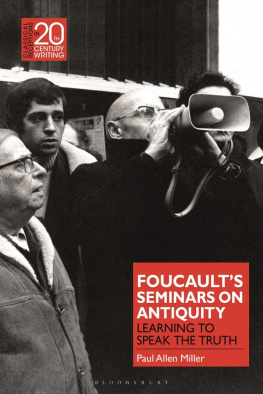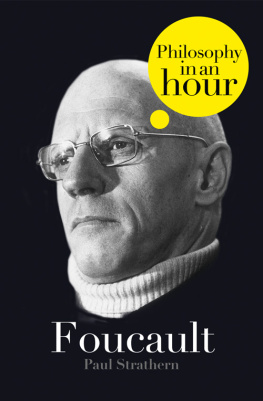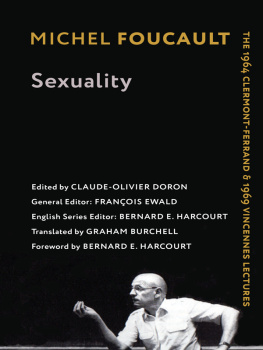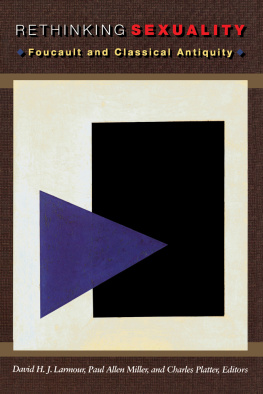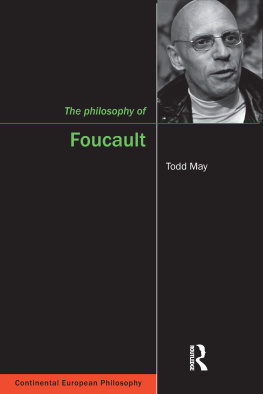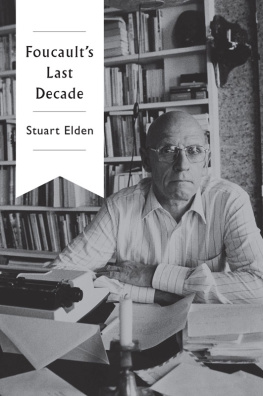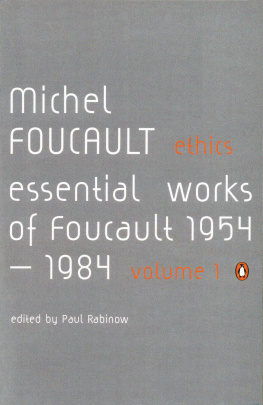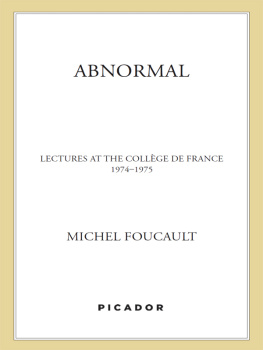Foucaults Seminars on Antiquity
To Chuck and David, that was a lot of fun, wasnt it?
Classical Receptions in Twentieth-Century Writings
Series Editor: Laura Jansen
Each book in this ground-breaking new series considers the influence of antiquity on a single writer from the twentieth century. From Woolf to Walcott and Fellini to Foucault, the modalities and texture of this modern encounter with antiquity are explored in the works of authors recognized for their global impact on modern fiction, poetry, art, philosophy, and socio-politics.
A distinctive feature of twentieth-century writing is the tendency to break with tradition and embrace the new sensibilities of the time. Yet the period continues to maintain a fluid dialogue with the Greco-Roman past, drawing on its rich cultural legacy and thought, even within the most radical movements that ostentatiously questioned and rejected that past. Classical Receptions in Twentieth-Century Writing approaches this dialogue from two interrelated perspectives: it asks how modern authors appeal to the classical past opens up new readings of their oeuvres and contexts, and it considers how this process in turn renders new insights into the classical world. This two-way perspective offers dynamic and interdisciplinary discussions for readers of Classics and modern literary tradition.
Also new in this series:
Fellinis Eternal Rome, Alessandro Carrera
James Joyce and Classical Modernism, Leah Culligan Flack
Tony Harrison: Poet of Radical Classicism, Edith Hall
Virginia Woolfs Greek Tragedy, Nancy Worman
Editorial Board
Prof. Richard Armstrong (University of Houston)
Prof. Francisco Barrenechea (University of Maryland)
Prof. Shane Butler (Johns Hopkins University)
Prof. Paul A. Cartledge (University of Cambridge)
Prof. Moira Fradinger (Yale University)
Prof. Francisco Garca Jurado (Universidad Complutense de Madrid)
Prof. Barbara Goff (University of Reading)
Prof. Simon Goldhill (University of Cambridge)
Dr. Constanze Gthenke (University of Oxford)
Prof. Edith Hall (Kings College London)
Prof. Judith Hallett (University of Maryland)
Dr. George Kazantzidis (University of Patras)
Prof. Andrew Laird (Brown University)
Prof. Vassilis Lambropoulos (University of Michigan)
Prof. Charles Martindale (University of Bristol/University of York)
Dr. Pantelis Michelakis (University of Bristol)
Prof. Neville Morley (University of Exeter)
Prof. James Porter (University of California, Berkeley)
Prof. Phiroze Vasunia (University College London)
Contents
Acknowledgments
This book has many beginnings. One of its earliest can be found in a 1992 conference I organized with Charles Platter and David Larmour at Texas Tech University on Foucaults History of Sexuality. Thanks are owed first to Chuck and David as good friends and peerless collaborators. Texas Tech University was very supportive as was the University of Georgia, where Chuck was domiciled. Wonderful colleagues from across the country like Amy Richlin, Page Dubois, David Halperin, Jeff Carnes, Nigel Nicholson, and Ellen Greene helped make it a success. From this conference came our book, Rethinking Sexuality: Foucault and Classical Antiquity (1998). A few years after the conference, I had a chance meeting with the late Wolfgang Haase at Boston University, which led to a plenary address at a meeting in Tbingen of the Institute for the Study of the Classical Tradition on The Classical Roots of Poststructuralism and a later publication in his journal. There followed an NEH grant in 2004 that allowed me to spend time in Paris where the records of Foucaults lectures were deposited at the Institut Mmoires de ldition contemporaine (since relocated to Normandy). There, I first discovered his late lectures, which had only just begun to be published. The grant also allowed me to write and publish Postmodern Spiritual Practices (2007), which led to an invitation from Miriam Leonard to contribute Diotima at the Barricades (2016) to a new series edited by her, Tim Whitmarsh, and Brooke Holmes at Oxford, Classics in Theory. So, when Laura Jansen then wrote and asked if I would like to write something on Cixous for her new series, Classical Receptions in Twentieth-Century Writing, intimidated by the prospect of tackling Cixouss more than seventy published books, I countered with Foucaults late lectures, et voil.
Along the way, I have incurred too many debts to catalog in full. But I would be remiss if I did not thank Jill Frank with whom I have had a wonderful and illuminating dialogue on Plato for the last twenty years. She read and offered comments on Chapter 3. Charles Stocking, who I first met as the worlds best postdoc, has been a valued interlocutor for many years. Charles read and offered comments on the Introduction and Chapter 1. Richard Armstrong and Alexandra Lianeri invited me to present in slightly altered form the contents of the Introduction at their virtual Translation and Classical Reception Studies Workshop, October 2020. Pierre Zoberman, who I first met many years ago in Tbingen, has hosted me more times than I can count in Paris, found me apartments, and generally made it possible and pleasant for me to pursue my research while in France. I also owe a debt to the University of South Carolina which generously provided me the sabbatical necessary to complete work on my manuscript. Lastly, thanks are owed to my reader, editors, and the entire superb team at Bloomsbury.
Series Editors Preface
The present volume marks the fifth innovative contribution to the series Classical Receptions in Twentieth-Century Writing (CRTW), a project that seeks to explore the modalities and textures of modern classicisms in the works of writers recognized for their global impact on modern philosophy, poetics, politics, and the arts. CRTW approaches this aim from two distinct yet interrelated perspectives: it asks how modern authors appeals to the classical past open up new understandings of their oeuvres and contexts, and it considers how this process in turn renders new insights into the classical world and its sense of impact on our modernity. In plotting twentieth-century receptions of Greco-Roman antiquity from this two-way perspective, the series aims to promote dynamic, highly interdisciplinary discussions for readers of Classics and Literary and Classical Studies. Indeed, a key feature of the series is its extensive range and scope. It looks at both Anglophone and non-Anglophone writers from modernities around the globe, as well as writers still or until recently active in their field, such as Tony Harrison in the fourth volume of the series, or our forthcoming studies in Wole Soyinka and Simon Armitage. Each of these authors is considered primarily as a writer whose interest in antiquity has contributed to a significant revision of philosophical and political thought, aesthetics, identity studies, gender studies, translation studies, visual culture, performance studies, urban studies and cultural criticism, amongst other areas of knowledge. In this sense, CRTW aspires to promote a new intellectual space and critical direction for those producing research on Twentieth-Century Studies with a focus on Classics and vice versa.

